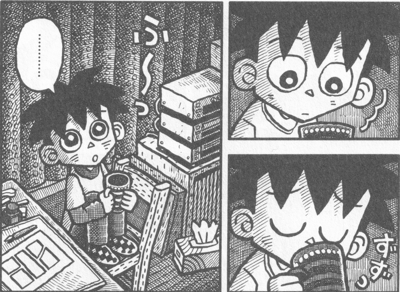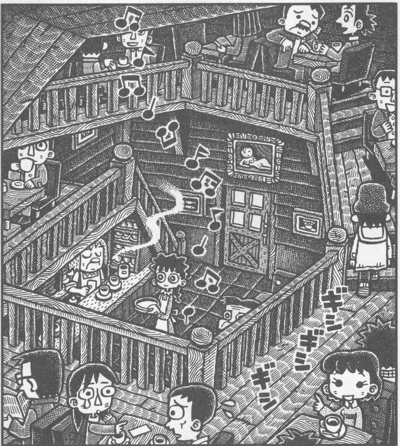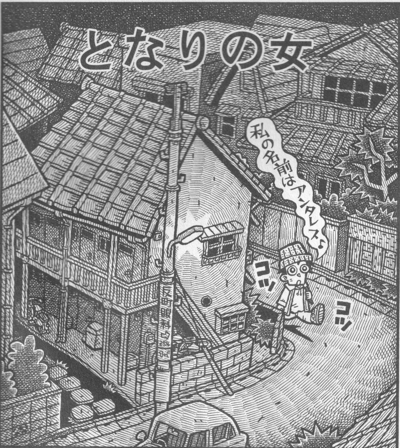The Japan Times has a short profile/interview of How to Japonese/me online today! Apparently they will be publishing it in the actual newspaper on Wednesday.
In the interview, one of the questions they ask is what Japanese books are good to read in order to improve spoken Japanese. Well, Murakami’s great and easy to read, of course, but I realized that manga are probably better than fiction since you are basically reading a script with visual cues.
One of my favorite manga is Naoto Yamakawa‘s 『コーヒーもう一杯』 published by Enterbrain. Yamakawa writes short coffee-themed manga and publishes one story a month in 月刊コミックビーム. The stories get collected into annual volumes which he intersperses with short prose poem type stories, also coffee-themed. He begins his first volume with one of these, explaining the title of the collection:
“One More Cup of Coffee” is the title of a song from Bob Dylan’s 1976 album Desire.
I started listening to Bob Dylan when I was a high school student, always listened to him after that, and listen to him even to this day.
When I first heard him I thought, “What the hell is this?” But as I kept listening, I got into the habit of listening to him and really came to like his music.
To give you an idea of how much I like him, sometimes I get on a train, see his name on a hanging advertisement, and get so surprised I almost lose my shit.
But when I look closer it doesn’t say Bob Dylan; it says things like volunteer (ボランティア) or body line (ボディ・ライン).
Beyond the title, this manga has no connection with Bob Dylan, but there are many pages I drew while listening to Bob Dylan.
The introduction perfectly captures the feel of the collection – coffee, like Bob Dylan’s music, is something that might take time to get used to, but once you start to enjoy it, it’s hard to live without. And because coffee is a daily ritual, it ends up being strongly connected to other experiences: people you went to coffee with, conversations shared over coffee, the intricate ritual of brewing coffee. The collection diagrams coffee as a social experience in modern Japan.
Brewing coffee is the theme of the first story of the collection:

But it’s also a love story. The young man making coffee in the image teaches the other man how to make coffee, which puzzles him since he already taught him how when working as his assistant. Through the flashbacks we realize that the young man Mameta (豆太; Yamakawa often uses 豆 in his names as a joke, since it’s the character for “bean”) had a crush on Aoyama’s girlfriend Motsumi. At the end of the story after the two have coffee, Mameta walks Aoyama to a cigarette vending machine where they buy Hope cigarettes, and Aoyama confesses that he’s split with Motsumi. Mameta returns to his small apartment, brews another batch of coffee and sits down to process everything that happened while enjoying a cup:

Yamakawa’s unique, warm drawing style is perfectly suited to the content. The stories are all sort of sad, strange and even nostalgic, but it’s a nostalgia for the present day – Yamakawa’s portraits of urban Japan are so romantic that they approach simulacra. He loves the coffee shops:

Used bookstores:

Apartments:

And streets of Japanese cities:

The illustrations in this series are a refreshing change from the kind of manga that gets translated and shipped abroad. I’ll take the back alleys of Shinagawa-ku over the bright lights of Shibuya any day of the week. I do frequent Dry Dock, after all, which I think is the closest I’ve come to a コーヒーもう一杯-esque location in the flesh.
I discovered the series while hunting for manga to read on a flight. I was actually looking for SOIL, also published by Enterbrain, but since they didn’t have it, I went for コーヒーもう一杯, and I’m sure glad I did. It’s perfect plane flight or train ride manga: the stories are short and manageable, fun to read, and beautiful to look at. Highly recommended.
Bonus link! Yamakawa has his own blog, through which I discovered that Volume 5 of コーヒーもう一杯 is the final volume. Probably for the best. All of the stories are good, but Volume 1 was by far the strongest.
